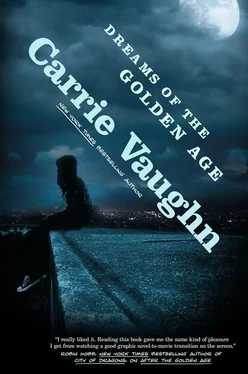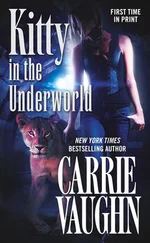“You may be right, for now,” he said. “We can at least enjoy tonight.”
She was surprised he agreed, and she stared at him for any nuance in his expression. He radiated only calm, with no indication of how hard he had to work for that calm.
“I love you,” she said.
* * *
That night, the kids roared home from school like a whirlwind. She didn’t need to check the cameras because it seemed she heard them all the way from the ground floor. They stormed into the penthouse, Bethy going on about two friends at school fighting over something ridiculous, and Anna grumbling at her about how there were more important things to worry about and could she please grow up, then Bethy insisting she was grown up, and Anna declaring she was going to take a nap and could everyone please leave her alone. They used to play together, Celia thought wistfully. They still had tubs of dolls and blocks in their bedrooms that they hadn’t touched in years.
From her office, Celia heard Suzanne call from the kitchen, “Don’t forget, we’re having company for dinner, so you can’t skip, okay?” Mumbled acknowledgments followed.
If Celia could just forget that she was sick, she’d be able to get through the next few hours without a problem.
She wrapped up her research, carefully purged her web browser of all medical links, and locked file folders in the safe. By the time she’d finished, washed up and changed into jeans and a blouse, and returned to the living room to crack open a bottle of wine, building security announced that Robbie Denton had arrived and was on his way up. She was at the front door to meet him when he emerged from the private elevator.
Once upon a time, Robbie Denton could run faster than the eye could see. As the Bullet, he had joined the Olympiad and battled crime and defeated supervillains. He was legendary.
Now he walked with a cane, held discreetly at his side to prop up a weak leg. Arthritis in the hips, the degeneration of joints that had worked many times harder than they’d been designed to. When he finally retired a good eight or so years ago, he revealed that he’d been in pain for a long time. He’d been slowing down, hoping no one would notice, until he finally stopped. He’d had hip replacement surgery. There’d been complications—his mutated physiology rejected the implants. Further surgeries kept him on his feet and out of a wheelchair but hadn’t given him back his speed.
He was terribly good-natured about it, Celia thought. He smiled and made jokes about the rest of him holding up just fine, and how he was lucky to have survived long enough to have these problems. Which made her think about her father, who’d had so much of his identity wrapped up in his powers that he probably wouldn’t have survived losing them. At least not easily.
Celia let Robbie fold her into a squeezing one-armed hug while he leaned on his cane.
“How you doing, kid?”
She would always be the kid to Robbie, even though she had two kids of her own now. Her smile turned stricken, but she moved on quickly, hoping he didn’t notice the hesitation. “I’m fine. Busy, tired, the usual, but fine.” And she would be, as long as she kept declaring it.
“Your mom in the kitchen? Is that stir-fry?” Robbie took a long breath through his nose.
“Yup.” They could hear the sizzling all the way in the foyer, not to mention smell the spices and vegetables. If they went to look in on her, they’d find her, wok in hand, pan spitting hot, stove cold. Still using her powers to do something as simple as cook a meal. She hadn’t burned herself out, so to speak. Powers were so unpredictable, so chaotic. Celia didn’t like to think what would happen if Arthur ever lost his powers—or lost control of them.
She quickly tucked that thought away because Arthur came in then from the elevator. He’d retreated to his own office to wrap up the week’s paperwork—pretty much at the exact moment Celia decided she’d be okay on her own, with her computer and a project. He’d probably been listening—sensing, scanning, however he did it—and knew that Robbie had arrived. The two men shook hands. Standing next to his former teammate, Arthur looked older. Not old—he was ten years younger than the rest of the Olympiad. But the sheen in his hair had begun to go silver, noticeable next to Robbie’s icy gray.
They were all so much older.
The kids came out a moment later, and Robbie gushed over them. He was their Uncle Robbie, and even Anna smiled for him. They trekked to the dining room adjoining the kitchen, and the evening rolled along nicely after that. The kids set the table. Everyone asked Suzanne if she needed help, but the cook shooed them away.
Sitting at the table next to Arthur, across from her children, Celia regarded the pleasant chaos of her life, which suddenly seemed fragile.
The food arrived, stir-fried pork with an amazing array of vegetables and perfectly seasoned noodles, and everyone oohed and ahhed, then debated the merits of chopsticks, the skills required to use them, and commenced eating.
Conversation started innocuously enough with the perennial topic of school, and Bethy went off for five minutes about math and thinking about trying out for the school play and the stupidity of book reports because it was all just opinion anyway, and she finally took another bite of food, which slowed her down. Anna stared at her plate, industriously paying attention to her bites and not much else. She didn’t even roll her eyes at Bethy’s monologue, like usual. Teia and Lew were back in school, she reported. They didn’t know why they’d been taken out in the first place. Their mother was having a midlife crisis or something, was Teia’s opinion.
Everyone else reported on the state of their lives. Celia made what she hoped was an unassuming comment about too many meetings, hoping to avoid an interrogation. She did, and talk moved on.
Then Robbie said, “How about the news lately? That new super team? Looks like we might finally have that second Olympiad we’ve been waiting for.”
Suzanne lamented, “Oh, yes, that photo. They all look so young. We were never that young, were we?”
Robbie snorted. “Everybody looks young to me these days.”
They’re Anna’s age, Celia thought, clamping her jaw shut so she wouldn’t speak. They’re Anna’s friends. Children. What would he say if it were Anna under one of those masks? She glanced at her elder daughter, who was staring at her plate, but her fork was still.
Celia’s father, Warren West, the legendary Captain Olympus, had wanted more than anything for Celia to follow in his footsteps and become a superpowered hero. He hadn’t gotten that. What would he think of his granddaughter following in his footsteps? Celia couldn’t even guess. She was so young.
Arthur, eternally serene, said, “The real test will be if they stick around, or if they quit after a year when they realize how tough the job is.”
“They do seem to be more enamored of the publicity than is really good for them, don’t they?” Suzanne said.
“I don’t know,” Robbie said, spearing noodles with a fork. “There’s something about these guys. I think they may be in it for the long haul. They have some real hard-core powers. They aren’t going to sit on the sidelines. And you know that anonymous tip that took down Scarzen? I think that might have been them, too.”
Celia realized the awful, ironic truth: In his retirement, since he was no longer able to live the vigilante lifestyle himself, Robbie had become a superhero groupie.
She said, as gently as she could manage, “What you really want is to sit them down and dispense advice, isn’t it?”
“If I thought they’d actually listen to an old man like me. But no, the books are out there, let them read up on me if they want advice. It’s all on paper.”
Читать дальше












